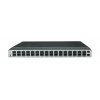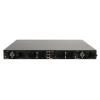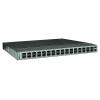-
$



Product Overview
Huawei CloudEngine 8800 series switches are 100G Ethernet switches designed for data centers and high-end campus networks. The switches provide high-performance, high-density 100GE/40GE/25GE/10GE ports, and low latency. Using the Huawei VRP8 software platform, CloudEngine 8800 series switches provide extensive data center service features and high stacking capability. In addition, the airflow direction (front-to-back or back-to-front) can be changed. CloudEngine 8800 series switches can work with CloudEngine 16800/CloudEngine 12800/CloudEngine 8800/CloudEngine 6800/CloudEngine 5800 switches to build an elastic, virtualized, high-quality fabric that meets the requirements of cloud-computing data centers.
CloudEngine 8800 series switches can function as core or aggregation switches on data center networks to help enterprises and carriers build a scalable data center network platform in the cloud computing era. They can also be used as aggregation or core switches for enterprise campus networks.
Product Characteristics
25GE Access Switch with Flexible Cards
- CloudEngine 8861 supports 25GE (SFP28)/10GE (SFP+) auto-sensing interfaces and is applicable to scenarios of highdensity 25GE/10GE server access.
- CloudEngine 8861 supports a maximum of 32*100GE, 64*40GE, or 128*25GE/10GE ports, delivering high-density access and aggregation capabilities through flexible card combinations.
- CloudEngine 8850 supports a maximum of 64*100GE, 64*40GE, 128*25GE, or 128*10GE ports, delivering high density access and aggregation capabilities
High-Density 100GE/40GE Aggregation and Outstanding Switching Capacity
- The CloudEngine 8850-64CQ-EI provides 12.8 Tbps switching capacity, forwarding performance of 4,482 Mpps, and supports L2/L3 line-speed forwarding.
- The CloudEngine 8850-64CQ-EI provides a maximum of 64*100GE QSFP28 or 64*40GE QSFP+ ports, and can function as the core or aggregation switch on a data center or campus network.
- The 100GE QSFP28 port supports 100GE optical modules. One 100GE port can be used as four 25GE SFP28 ports. The 100GE QSFP28 port also supports 40GE QSFP+ optical modules. 40GE ports can be converted to 10GE ports through QSFP+ breakout cable.
- The CloudEngine 8861 supports 100GE/40GE/25GE/10GE flexible cards, delivering flexible networking capability. It can work with CE12800/CE6800/CE5800 series data center switches to build a non-blocking network platform.
Network-Wide Reliability, Ensuring Zero Service Interruptions
- The CloudEngine 8800 series switches support multichassis link aggregation group (M-LAG), which enables links of multiple switches to aggregate into one to implement device-level link backup.
- Switches in an M-LAG system can be upgraded independently. During the upgrade, other switches in the system take over traffic forwarding to ensure uninterrupted services.
- With the comprehensive inter-device link aggregation technology, the device networking coupling relationship evolves from stacking at the control plane to the use of M-L AG and then finally to coupling-free M-LAG Lite. This achieves active-active server access and high reliability during switch upgrage.
Programmable Network Device, Flexible Customization
- The CloudEngine 8800 series switches use the Open Programmability System (OPS) embedded in the VRP8 software platform to provide programmability at the control plane.
- The OPS provides open APIs. APIs can be integrated with mainstream cloud platforms (including commercial and open cloud platforms) and third-party controllers. The OPS enables services to be flexibly customized and provides automatic management.
- Users or third-party developers can use open APIs to develop and deploy specialized network management policies to implement extension of fast service functions, automatic deployment, and intelligent management. The OPS also implements automatic operation and maintenance, and reduces management costs.
- The OPS provides seamless integration of data center service and network in addition to a service-oriented, softwaredefined networking (SDN).
Virtualized Gateway Achieves Fast Service Deployment
- The CloudEngine 8800 series switches can work with a mainstream virtualization platform. As the high performance, hardware gateway of an overlay network (VXLAN), the CloudEngine 8800 series switches can support more than 16 million tenants.
- The CloudEngine 8800 series switches can connect to a cloud platform through an open API to provide unified management of software and hardware networks.
- This function implements fast service deployment without changing the customer network. It also protects customer investments.
Standard Interfaces, Enabling Openness and Interoperability
- CloudEngine 8800 series support NETCONF and can work with Huawei iMaster NCE-Fabric.
- CloudEngine 8800 series support Ansible-based automatic configuration and open-source module release, expanding network functions and simplifying device management and maintenance.
- CloudEngine 8800 series can be integrated into mainstream SDN and cloud computing platforms flexibly and quickly.
ZTP, Implementing Automatic O&M
- The CloudEngine 8800 series switches support Zero Touch Provisioning (ZTP). ZTP enables the CloudEngine 8800 to automatically obtain and load version files from a USB flash drive or file server, freeing network engineers from onsite configuration or deployment. ZTP reduces labor costs and improves device deployment efficiency.
- ZTP provides built-in scripts for users through open APIs. Data center personnel can use the programming language they are familiar with, such as Python, to provide unified configuration of network devices.
- ZTP decouples configuration time of new devices from device quantity and area distribution, which improves service provisioning efficiency.
Intelligent Lossless DCN, Improving Reliability of High-Performance Computing
- In a distributed system, RoCE technology becomes the mainstream. To ensure the throughput and meet strict requirements on packet loss, Huawei ultra-fast Ethernet provides forwarding capabilities with high throughput, high reliability, and low latency for the distributed system, which is 25% lower than the average latency in the industry.
- The CloudEngine 8861-4C-EI/8850-64CQ-EI switches support Virtual Input Queue (VIQ) technology. It uses Huawei customized algorithm to customize virtual queues based on services, implementing refined management. It pre-determines uplink and downlink queue congestion to eliminate packet loss.
- The CloudEngine 8861-4C-EI/8850-64CQ-EI switches use fast CNP and dynamic ECN to pre-determine network congestion and provide fast feedback, reducing retransmission and throughput decrease caused by packet loss on a network. This keeps a low queue delay while ensuring the throughput.
- The CloudEngine 8861-4C-EI/8850-64CQ-EI switches provide dynamic load balancing (DLB) based on the ECMP group or LAG.
- The CloudEngine 8861-4C-EI/8850-64CQ-EI switches support analyzing RoCE flow KPIs, including the flow path, RTT, throughput, packet loss rate, abnormal sessions, and top sessions, and display the RoCE network topology of each node and ECN thresholds of Huawei AI Fabric. In this way, more proper network parameters can be configured and network faults can be quickly located, improving configuration and O&M efficiency.
FabricInsight-based Intelligent O&M
- The CloudEngine 8800 provides telemetry technology to collect device data in real time and send the data to Huawei data center network analyzer iMaster NCE-FabricInsight. The iMaster NCE-FabricInsight analyzes network data based on the intelligent fault identification algorithm, accurately displays the real-time network status, effectively demarcates and locates faults in a timely manner, and identifies network problems that affect user experience, accurately guaranteeing user experience.
iMaster NCE-based Simplified Network Deployment
- CloudEngine 8800 series switches can interconnect with iMaster NCE-Fabric through standard protocols such as NetConf and SNMP to implement network automatic management and control, providing more efficient and intelligent operation methods, simplifying network management, and reducing the OPEX.
Flexible Airflow Design, High Energy Efficiency
Flexible front-to-back/back-to-front airflow design
- The CloudEngine 8800 series switches use a front-to-back/back-to-front airflow design that isolates cold air channels from hot air channels. This design meets heat dissipation requirements in data center equipment rooms.
- Air can flow from front to back or back to front depending on the fans and power modules that are used.
- Redundant power modules and fans can be configured to ensure service continuity.
Innovative energy-saving technologies
- The CloudEngine 8800 series switches have energy-saving chips and can measure system power consumption in real time. Fan speed can be adjusted dynamically based on system consumption. These energy-saving technologies reduce O&M costs and contribute to a greener data center.
Clear Indicators, Simplifying Maintenance
Clear indicators
- Port indicators clearly show the port status and port rate. The 40GE port indicators can show the states of all ports derived from the 40GE ports.
- State and stack indicators on both the front and rear panels enable users to maintain the switch from either side.
- The CloudEngine 8800 series switches support remote positioning. Operators can turn on remote positioning indicators on the switches they want to maintain, so that they can find switches easily in an equipment room full of devices.
Simple maintenance
- The management port, fans, and power modules are on the front panel, which facilitates device maintenance.
- Data ports are located at the rear, facing servers. This simplifies cabling.
N1-CloudFabric Foundation SW License (N1-CE88LIC-CFFD) license
Product Specifications
| CE8850-32CQ-EI-AC | |
|---|---|
| Hardware Specifications | |
| Dimensions (W × D ×H, mm) |
442*420*43.6 mm |
| Weight (excluding optical modules, power modules, and fan assemblies/ including AC power modules and fan assemblies, excluding optical modules, kg) |
6.2/9 |
| Switching capacity | 6,44 Tb/s |
| Forwarding performance |
3200 Mp/s |
| Ports |
32*100GE QSFP28 and |
| Number of card slots | 0 |
| Out-of-band management port |
1*GE RJ45 management interfaces |
| Console port | 1*RJ45 interface |
| Port USB | 1 |
| CPU Main frequency (GHZ) | 1,5 GHz |
| Number of cores | 8 |
| RAM | 4 GB |
| NOR Flash | 32 MB |
| NAND Flash | 1 GB |
| System buffer | 22 MB |
| Power Supply System | |
| Power modules | AC 600 W |
| Rated voltage range(V) | 100 - 240 V |
| Maximum voltage range(V) | 90 - 290 V |
| Maximum input current | 9 A |
| Typical power |
219W (100% traffic load, copper cable, normal temperature, dual power |
| Maximum power | 453 W |
| Frequency (AC, HZ) | 50 / 60 |
| Environment specifications | |
| Maximum heat consumption (BTU/hr) | 1544 |
| Cooling system |
Active 2 fan trays |
| Long-term operating temperature(°C) |
0°C to 40°C (0-1800m) |
| Storage temperature(°C) |
-40°C to +70°C |
| Relative humidity | 5% to 95% |
| Sound power at 27°C | < 65 dBa |
|
Sound power at 40°C |
< 88 dBa |
| MTBF | 45,34 years |
|
Functions and Features |
|
| Device virtualization | iStack M-LAG |
| Network virtualization | VXLAN routing and bridging BGP-EVPN QinQ access VXLAN |
| Data center interconnect |
VXLAN mapping, implementing interconnection between multiple DCI networks at Layer 2 |
| SDN | iMaster NCE-Fabric VMware NSX (supported by CloudEngine 8861) |
| Network convergence | DCBX, PFC, ETS RDMA and RoCE (RoCE v1 and RoCE v2) |
| Programmability | OPS Ansible-based automatic configuration and open-source module release |
| Traffic analysis | NetStream sFlow |
| VLAN | Adding access, trunk, and hybrid interfaces to VLANs Default VLAN QinQ MUX VLAN GVRP |
| MAC address table |
Dynamic learning and aging of MAC address entries |
| IP routing | IPv4 routing protocols, such as RIP, OSPF, IS-IS, and BGP IPv6 routing protocols, such as RIPng, OSPFv3, IS-ISv6, and BGP4+ |
| IPv6 | IPv6 Neighbor Discovery (ND) IPv6 VXLAN over IPv4 Path MTU Discovery (PMTU) TCP6, IPv6 ping, IPv6 tracert, IPv6 socket, UDP6, and Raw IP6 |
| Multicast | Multicast routing protocols such as IGMP, PIM-SM, PIM-DM, MSDP, and MBGP IGMP snooping IGMP proxy Fast leaving of multicast member interfaces Multicast traffic suppression Multicast VLAN Multicast VXLAN |
| Reliability | Fine-grained microsegmentation isolation (Supported only by CE8861-4C-EI) Link Aggregation Control Protocol (LACP) STP, RSTP, VBST, and MSTP BPDU protection, root protection, and loop protection Smart Link and multi-instance Device Link Detection Protocol (DLDP) ERPS (G.8032) Hardware-based Bidirectional Forwarding Detection (BFD) (Supported by CloudEngine 8850-64CQEI and CloudEngine 8861) VRRP, VRRP load balancing, and BFD for VRRP BFD for BGP/IS-IS/OSPF/Static route BFD for VXLAN |
| QoS | Traffic classification based on Layer 2 headers, Layer 3 protocols, Layer 4 protocols, and 802.1p information ACL, CAR, re-marking, and scheduling Queue scheduling algorithms, including PQ, WRR, DRR, PQ+WRR, and PQ+DRR Congestion avoidance mechanisms, including WRED and tail drop Traffic shaping |
| O&M |
Network-wide path detection |
| AI Fabric | VIQ, Dynamic ECN, Fast CNP, Dynamic load balancing (DLB), RoCE flow visibility (Supported by CloudEngine 8850-64CQ-EI and CloudEngine 8861) |
| Configuration and maintenance |
Console, Telnet, and SSH terminals Network management protocols, such as SNMPv1/v2/v3 File upload and download through FTP and TFTP BootROM upgrade and remote upgrade 802.3az Energy Efficient Ethernet (EEE) Hot patches User operation logs Zero Touch Provisioning (ZTP) |
| Security and management | Command line authority control based on user levels, preventing unauthorized users from using commands Defense against DoS address attacks, ARP storms, and ICMP attacks Port isolation, port security, and sticky MAC Binding of the IP address, MAC address, port number, and VLAN ID Authentication methods, including AAA, RADIUS, and HWTACACS Remote Network Monitoring (RMON) |
|
Performance and Scalability |
|
| Maximum number of MAC address entries | 136k |
| Maximum number of Forwarding routes (FIB IPv4/IPv6) |
192K / 128K |
| ARP table size | 84K |
| Maximum number of VRF | 1024 |
| IPv6 ND (Neighbor Discovery) table size | 32K |
| Maximum Number of multicast routes (Multicast FIB IPv4/IPv6) | 8K / 2K |
| Maximum VRRP groups | 256 |
| Maks. ilość doment broadcast | 8K |
| Maximum number of BDIF | 4K |
| Maximum number of tunnel endpoints (VTEP) | 2K |
| Maximum number of lag group | 1024 / 512 / 256 / 128 / 64 |
| Maximum number of MSTP instance | 64 |
| VBST | 500 |






 Polski
Polski English
English Italiano
Italiano Español
Español Čeština
Čeština Српски
Српски Deutsch
Deutsch Ελληνικά
Ελληνικά Slovenský
Slovenský




